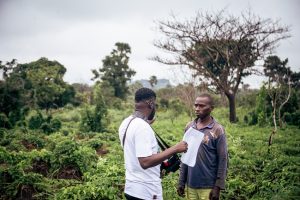Ghana’s response to the climate crisis in its agriculture sector will be brought to the attention of global audiences in a new series presented by the Global Climate and Health Alliance, featuring films produced for CGIAR by BBC StoryWorks Commercial Productions.

The series, titled: “The Climate and Us”, launched on October 31, takes audiences on a cinematic journey worldwide, highlighting the critical link between our changing climate and its profound effects on our well-being.
Through 31 compelling stories spanning six continents, the series explores the realities faced by communities affected by climate-related disasters and emerging health crises. It highlights the incredible resilience of the people impacted and the wide-ranging solutions they employ to shield their lives.
The first episode in “The Climate and Us” series of films – “The Leaf Helping Yam Farmers Stop Pests” – launched on November 19 and explores how rising temperatures create the perfect climate for pests to thrive and attack crops on Ghana’s farms.
It spotlights the Accelerating the Impact of CGIAR Climate Research for Africa (AICCRA) project and its work with yam farmers, using an affordable natural solution derived from the Neem tree to protect their crops.
Dr. Ghislain Tepa Yotto, AICCRA Ghana Leader, explains: “We teach farmers how to harvest and produce neem leaf powder. And train them how to effectively apply the neem leaf powder.”
“By adopting this natural means of combating pests, farmers and stakeholders can act to mediate the effects of climate change on crops, using nature-based solutions that lower the cost of food production and promote food safety,” he added.
Climate change has exacerbated pests and disease outbreaks worldwide, leading to 40 percent of food crops being destroyed annually. In Ghana, such “invasive alien species” (as they are more technically known) cause food and agriculture-related losses valued at $50 million annually.
With the cost of food, production more than doubled due to inflated prices for pesticides and weedicides and the safety concerns posed by farmers’ overuse of chemical pesticides becoming an urgent challenge. Using natural enemies to fight pests – such as neem leaf powder – is seen as a safe and cost-effective measure to boost Ghana’s food security.
The AICCRA team in Ghana supports farmers in harnessing natural solutions for pest control through the science of Climate-Smart Integrated Pest and Disease Management.
The project works with national and grassroots partners to improve farmers’ access to weather forecasts and the technology and innovation that underpins an approach to farming called “climate-smart agriculture” which aims to bolster farmers’ livelihoods and food security in a changing climate.
The episode follows Kwasi Baafol Samuel, a farmer in Adomano. He’s been farming for over 10 years, having been taught how to farm by his father. By growing maize, cassava and yam, Kwasi provides for his family.
“The climate is different now,” he says. “Last year the short drought came early, and the rain is too unpredictable. It caused big problems to my farm, and the pests destroyed my yams and the crops.”
Kwasi’s wife, Gmalangari Baafol, explains the process: “We pluck fresh leaves from the bushes and bring them home. We then dry them under shade. We pound the leaves into powder. We store the powdered leaves and use it when we are ready to plant yams.”
Kwasi concludes the episode, stating: “I’m hoping the other farmers join me in using neem leaf powder, simply because this year when I harvest my yam, there was no pest attack in it and I had good yield.”
By Kofi Adu Domfeh
